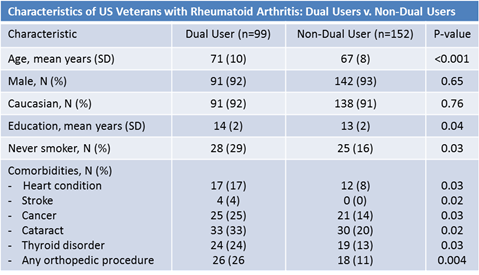Session Information
Date: Monday, November 9, 2015
Session Type: ACR Poster Session B
Session Time: 9:00AM-11:00AM
Background/Purpose: While use of multiple health
care systems may allow rapid access to medical care, the practice results in
fragmented and redundant treatments at a higher cost. A common source of dual
care in the US is characterized by health care provided by both the Veterans
Affairs (VA) Healthcare System and any additional federal or private health care
coverage. In a 2010 survey of VA enrollees, 75% of those 65 or older and 51%
of those under 65 received dual care. The objective of this study was to evaluate
dual care use by patients enrolled in the Veterans Affairs Rheumatoid Arthritis
Registry (VARA), a longitudinal multi-site disease registry and to compare
patient characteristics of dual users (DUs) and non-dual users (NDUs).
Methods: A questionnaire based on the National Data
Bank for Rheumatic Diseases inquiring about dual care utilization was sent to veterans
with RA enrolled in VARA at 3 sites characterized by beneficiaries from both
urban and rural settings (Oregon, Nebraska, and Utah). Veterans reported medical
services from a non-VA primary care provider or non-VA subspecialist. Information
on co-morbidities, non-VA medications, and non-VA hospitalizations was also collected.
T-tests for continuous variables and Pearson chi-square tests for categorical
variables were performed to compare characteristics of DUs versus NDUs. Fisher’s
exact test was used to compare comorbidities between the two groups.
Results: Of 526 veterans surveyed, 310 (59%)
responded (74%, 69%, and 52% in Oregon, Nebraska, and Utah respectively). Data
on the initial 251 responders are presented here. Approximately one-fourth (26%)
of enrollees reported having a non-VA primary care physician, 22% reported
having a non-VA subspecialist (a third of these were cardiologists) and 5% reported
having a non-VA rheumatologist. With respect to medication use, 24% of
respondents received non-VA non-RA medications and only 5% reported receiving a
non-VA synthetic DMARD, biologic DMARD, or corticosteroids. Overall, nearly 1 in
10 veterans had been hospitalized at a non-VA facility within 6 months prior to
the survey. A comparison of patient characteristics revealed that DUs were
older, had more years of education, and were more likely to have never been
smokers compared to NDUs; additionally, DUs reported more comorbidities and
orthopedic procedures than NDUs (Table).
Conclusion: VARA participants have a lower rate of
dual care utilization than previously reported for the overall VA population, with
very few patients receiving dual rheumatology care or non-VA RA medications. This
survey suggests that the majority of US veterans enrolled in VARA utilize the VA
as their single source of RA care.
To cite this abstract in AMA style:
Schwab P, Sayles H, Bergman D, Cannon GW, Michaud K, Mikuls TR, Barton J. Dual Care Utilization in Patients Enrolled in the Veterans Affairs Rheumatoid Arthritis Registry [abstract]. Arthritis Rheumatol. 2015; 67 (suppl 10). https://acrabstracts.org/abstract/dual-care-utilization-in-patients-enrolled-in-the-veterans-affairs-rheumatoid-arthritis-registry/. Accessed .« Back to 2015 ACR/ARHP Annual Meeting
ACR Meeting Abstracts - https://acrabstracts.org/abstract/dual-care-utilization-in-patients-enrolled-in-the-veterans-affairs-rheumatoid-arthritis-registry/

